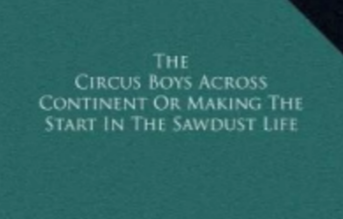CHAPTER VII — The Circus Boys Across the Continent
byCHAPTER VII — The Circus Boys Across the Continent begins in a whirlwind as Teddy Tucker, clutching a pail of muddy water, dashes through the circus grounds with Larry and other angry canvasmen on his heels. What started as a prank quickly spirals into a wild chase, disrupting rehearsals and crashing into the performers’ dressing tent. Clotheslines snap, props tumble, and makeup spills as startled artists scramble to protect their space. Amid the chaos, Phil Forrest intervenes, knocking Larry off his feet before further damage can be done. The moment draws attention from Mr. Miaco, the sharp-witted head clown, who quickly takes control of the situation. To restore order without escalating conflict, Miaco suggests holding an impromptu trial—an idea welcomed by the performers, eager for both justice and amusement.
Oscar, the circus midget known for his deadpan humor and quick judgments, is chosen to preside over the playful proceedings. The performers, seated like a mock court, listen as Teddy and Larry share conflicting accounts, both laced with exaggeration and dramatic flair. Despite Phil’s efforts to argue for a fair outcome, the majority leans toward theatrical justice. Oscar renders his verdict with flair: Larry is to be “ducked” in a barrel as punishment. Amid roaring laughter, the sentence is carried out with enthusiastic ceremony, and Larry is ungracefully dunked. Though it appears harmless, the punishment carries undertones of collective frustration—many had grown weary of Larry’s bullying. The act bonds the troupe, reinforcing the circus’s unique, self-regulating culture, where order is often restored with creativity rather than confrontation.
Larry’s embarrassment quickly festers into anger. Not long after the trial ends, his allies begin hurling stones at the tent in retaliation, forcing the performers to scatter for cover. Phil, ever protective, steps outside to confront the threat, only to find himself the new target. Relying on agility and instinct, he dodges the attacks and leads his pursuers in a confusing chase across the lot. His quick turns, clever use of equipment, and fearless pace leave his attackers stumbling. One slips on a length of rope, another barrels into a stack of buckets, and soon the group collapses in a heap of their own missteps. The incident ends not in injury, but in comic humiliation—mirroring the slapstick nature of the circus itself.
As the dust settles, Phil checks on the others and helps reset the tent, showing leadership and calm amid the lingering tension. Though the retaliation was unjustified, he avoids pushing for revenge, instead prioritizing peace and order. Teddy, while still grinning about the prank that started it all, begins to recognize the weight of his actions. Phil’s influence—steady, fair, and forward-thinking—sets an example. Their conversation later that evening, as they share a quiet meal, circles back to lessons learned. Teddy reflects on how mischief can quickly tip into real trouble, while Phil reminds him that standing up for others often means keeping the bigger picture in view.
The chapter paints a vivid portrait of life behind the circus curtain—where humor and discipline, spectacle and sincerity, are always interwoven. The mock trial, though whimsical, reinforces the troupe’s core values: loyalty, accountability, and unity. No one in the circus is above consequence, but justice here takes on a character all its own—measured not by harshness, but by communal spirit. The stunts and antics may seem absurd, yet they reflect a social structure where respect is earned, and where each member, from the smallest performer to the tallest roustabout, has a role to play.
In this slice of circus life, Phil’s moral compass shines as brightly as his athleticism. His ability to balance laughter with leadership, and mischief with fairness, continues to earn the respect of his peers. Even Larry’s downfall—both literal and figurative—serves as a reminder that within the tent, actions have consequences, but redemption is never out of reach. The episode, though chaotic, brings the circus family closer, turning conflict into cohesion. And as the tents are patched and the ring cleaned for the next show, the boys walk off, shoulders squared and spirits high, ready for whatever tomorrow’s performance—and life—may bring.

